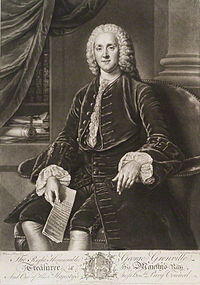George Grenville
Prime minister
George Grenville (14 October 1712 – 13 November 1770) was a British Whig statesman who rose to the position of Prime Minister of Great Britain. Grenville was born into an influential political family and first entered Parliament in 1741 as an MP for Buckingham. He emerged as one of Cobham's Cubs, a group of young members of Parliament associated with Lord Cobham.In 1754 Grenville became Treasurer of the Navy, a position he held twice until 1761. In October 1761 he chose to stay in government and accepted the new role of Leader of the Commons causing a rift with his brother-in-law and political ally William Pitt who had resigned. Grenville was subsequently made Northern Secretary and First Lord of the Admiralty by the new Prime Minister Lord Bute. On 8 April 1763, Lord Bute resigned, and Grenville assumed his position as Prime Minister. His government tried to bring public spending under control and pursued an assertive foreign policy. His best known policy is the Stamp Act, a common tax in Great Britain onto the colonies in America, which provoked widespread opposition in Britain's American colonies and was later repealed. Grenville had increasingly strained relations with his colleagues and the King and in 1765 he was dismissed by George III and replaced by Lord Rockingham. For the last five years of his life Grenville led a group of his supporters in opposition and staged a public reconciliation with Pitt.
Personal facts
| Birth date | October 14, 1712 |
|---|
| Birth place | England , London , Westminster |
|---|
| Religion | |
|---|
| Date of death | November 13, 1770 |
|---|
| Place of death | |
|---|
| Education | |
|---|
